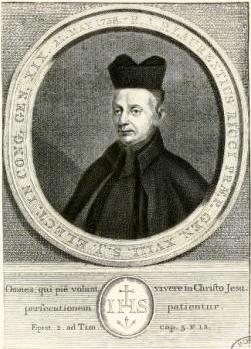Lorenzo Ricci facts for kids
Lorenzo Ricci, S.J. (born August 2, 1703 – died November 24, 1775) was an Italian Jesuit priest. He was chosen to be the eighteenth Superior General of the Society of Jesus, which means he was the worldwide leader of the Jesuit order. He was also the last leader before the Jesuits were temporarily shut down in 1773.
Contents
Early Life and Education
Lorenzo Ricci was born in Florence, Italy. His family was very old and respected in the region of Tuscany. When he was young, he went to Prato to study at the Cicognini College, which was run by the Jesuits.
Ricci joined the Society of Jesus when he was almost 15 years old, on December 16, 1718. He studied philosophy and theology at the Roman College in Rome. After finishing his studies, he taught in Siena and Rome. In 1736, he officially became a Jesuit priest. From 1751 to 1755, he worked as a spiritual director at the Roman College. This meant he helped people with their religious and spiritual journeys, often guiding them through special retreats called the Spiritual Exercises of Ignatius of Loyola. In 1755, he became the secretary of the Jesuit order.
Becoming the Jesuit Leader
In May 1758, Lorenzo Ricci was elected as the Superior General of the Society of Jesus. This happened at a big meeting called a General Congregation. Some people thought he was too calm and quiet for such a challenging role, especially during a time when the Jesuits faced many problems. Ricci himself even asked if he could be excused from the job.
Challenges for the Jesuits
During Ricci's time as leader, the Jesuit order faced many difficulties, especially from powerful royal families in Europe.
Jesuits in Portugal
Just a few months after Ricci was elected, there was an attempt to harm King Joseph I of Portugal. The Prime Minister, Carvalho, blamed a Jesuit priest named Gabriel Malagrida for being involved. Malagrida was found guilty of treason. Because he was a priest, he couldn't be executed without the church's permission. So, he was executed for heresy (going against church teachings) instead.
In September 1759, the Jesuits were forced to leave Portugal. This order also applied to all Portuguese lands, including Brazil, Goa, and Macao.
Jesuits in France
In France, the Jesuits had upset influential people, including Madame de Pompadour, who was close to the King. She reportedly wanted to receive religious sacraments, but the priests hesitated because of her relationship with the King. After this, she became a strong opponent of the Jesuits.
Another major problem came from a Jesuit named Antoine de La Valette. He was in charge of missions in Martinique and had borrowed a lot of money. His missions went bankrupt when British ships seized goods being sent to France. The Jesuit order tried to help, but a war made it difficult.
France was also facing financial problems due to the Seven Years' War. The Duke de Choiseul, a powerful minister, saw the Jesuits' wealth as a way to help the country's finances. Even though the French Jesuits tried to pay back the debts, the entire Society was held responsible. All their property was seized, making the Jesuits in France bankrupt.
The Society of Jesus was expelled from France in 1764. They were also forced out of Spain and Naples in 1767, and from Parma in 1768. Lorenzo Ricci, as their leader, watched helplessly as these events unfolded.
The Pope and the Suppression
While Clement XIII was Pope, the Jesuits had some protection in Rome. The Pope even publicly supported the Society in 1769. He encouraged Ricci to be brave and patient.
Ricci, who was very spiritual, sent letters to Jesuits encouraging them to pray. However, political pressure on the Pope grew stronger. When a new Pope, Clement XIV, was elected in 1769, the future of the Jesuits was a major topic. It's not clear if Clement XIV promised to shut down the order.
After becoming Pope, Clement XIV made some difficult decisions against the Jesuits to try and calm their enemies. But the pressure continued. Finally, on July 21, 1773, the Pope officially suppressed (shut down) the Jesuit order. He said he did this to "restore peace in the Church."
Imprisonment and Death
After the Jesuits were suppressed, their communities were broken up, their libraries were taken, and their properties were looted. Under pressure from the Spanish ambassador, Lorenzo Ricci was put in jail at the Castel Sant'Angelo in Rome. He was treated poorly and wasn't even allowed to celebrate Mass.
No formal charges were ever brought against the Jesuits in court. Before he died, Ricci solemnly declared that the Society of Jesus had done nothing to deserve being shut down, and there was no good reason for him to be in jail. He is buried in the crypt of the Gesù Church in Rome.
About six weeks after Ricci's death, Pope Pius VI ordered the release of Ricci's five assistants who had also been imprisoned.
See also
In Spanish: Lorenzo Ricci para niños
 | Bayard Rustin |
 | Jeannette Carter |
 | Jeremiah A. Brown |


